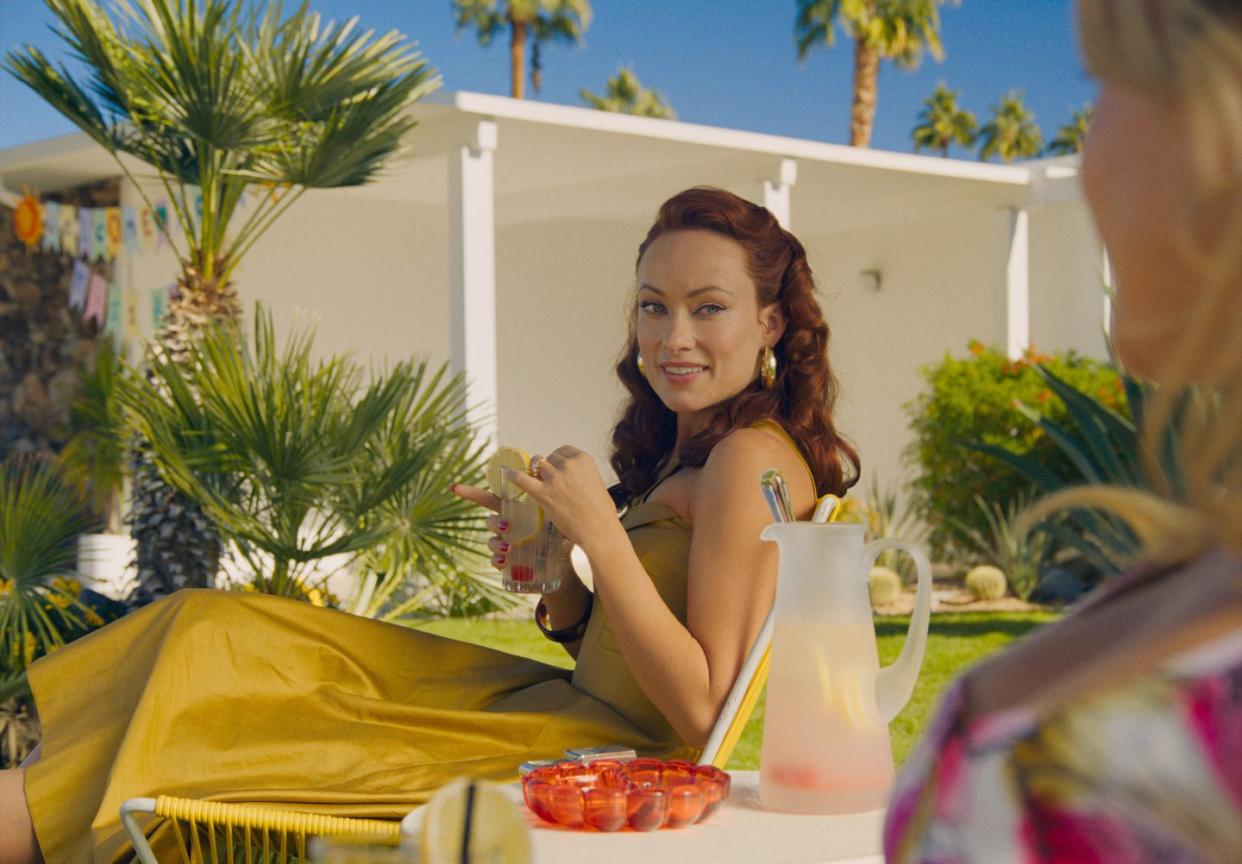Don't Worry Darling is a beautifully made but ultimately unfulfilling dystopian thriller

There are two clichés that can be foisted upon Olivia Wilde's sophomore feature Don't Worry Darling. The first is there's no such thing as bad publicity. The second is: the proof is in the pudding.
Whether or not the publicity that has dogged Don't Worry Darling for the last several months results in a boon for Warner Bros or not remains to be seen (which is the pudding, if you will) but it's hard to divorce the film from the drama, which ranges from minor and titillating to egregious and uncomfortable, that has hounded the film and its cast.
Chief amongst that cast is Florence Pugh, who leads the film with her unmatchable talent, leaving co-star Harry Styles in her dust. She plays his perfect '50s suburban housewife Alice, who begins to awaken to the mysterious goings-on within their seemingly idyllic home in the middle of the desert.

Don't Worry Darling says things that have been said before. This is in itself fine, except it doesn't say them in any new or exciting way. Instead, it feels like a pastiche of the best commentaries on gender stricture and the weaponisation of the American dream to stifle the individual.
Wilde is clearly a filmmaker with vision: the cinematography is both beautiful and clever, placing Alice almost always in the centre of the universe. She uses circular camera angles to spin the gravitational pull of the film around Alice, which is both nauseating (in a good way, if that could ever be) and an effective tool at drawing us into her world.
In fact, some of the only times Alice isn't the centre of focus are during her sex scenes, which make them feel strangely uncomfortable. This is either a clever move on Wilde's part based on where the film goes, or a hollow attempt to feed into the audience's lust for Styles; we can't decide which, unfortunately, which could be down to the behind-the-scenes information which has become common knowledge, or the lack of consistency in the way in which Styles' Jack is framed (literally) on screen.

Chris Pine perfects the role of cult leader Frank: dripping with enigmatic sensuality and towering but effortless intelligence, his cadence reflects that of a preacher, luring you into his vision for a world that bends to his will.
His wife Shelly, played by Gemma Chan, moves through the film with airy confidence and ethereal grace that is both frightening and desirable – she is the ultimate queen bee, you want her and want to be her at the same time, even as you're afraid of her.
With all of these themes at play, Wilde doesn't pick one upon which to build her house: fear, paranoia, gender, monogamy, the American dream, big brother; they all shift places constantly, creating a piecemeal foundation that can't support the weight of the film's lofty ambitions.
Taking cues from the likes of The Yellow Wallpaper, The Stepford Wives, Metropolis, Suspiria, 1984 and more, Don't Worry Darling leans too far away from homage and inspiration towards blatant hat-tipping, a sort of cinephile virtue-signalling.

None of this hampers Pugh, who has by now established herself as an actor of some calibre. Pine is her only match; the two share few scenes together but when they do the tension sizzles and you remember what acting really is.
Still, Styles looks the part, with his immaculate '50s coif, fresh-faced looks but strong jaw (it feels almost impossible that Shia LeBoeuf initially played the role of Jack, even without the sexual abuse allegations that hang over him). Unfortunately for Styles, he has lines.
He tries, really he does, but that trying is the only thing you see next to shouting (yes, that clip going around Twitter pretty well sums it up). There is no soul to the character, which in another film might work, but in this one does not.

It is never more obvious than in one particular scene which seems set up for a shot/reverse shot moment only for the camera to stay on Pine's face while the back of Styles' head simply nods — he has no lines and no facial expression for us to see.
While this could read as a deliberate choice on Wilde's part to bring us closer to Frank as the magnetic leader, you can't help but feel like the editing was purposeful to avoid the jarring gap between Pine and Styles' screen presence.
That being said – as everyone else is saying – it is a movie that feels like a movie. It is lush and vibrant, purposeful in almost every shot, and full of subtle idiosyncrasies that speak to Wilde's cleverness as a filmmaker, buoyed by Pugh's performance, an exceptional score, and vibrant set and costume design.

But Don't Worry Darling ruptures under the weight of it all — one too many inconsistencies, a vapid and confused third act reveal which shoe-horns in yet another theme (though we'll leave that one out for spoilers' sake), and the knowledge that a more powerful story exists somewhere within the visual and aural opulence, subsumed by the need to have it all.
Maybe it is the perfect reflection of the American dream after all.
Don't Worry Darling is out in UK cinemas on Friday, September 23
You Might Also Like
